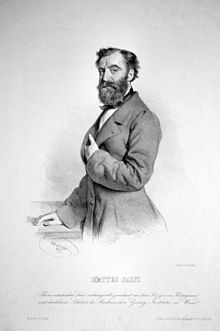Matteo Salvi

Luigi Matteo Salvi (born October 24, 1816 in Sedrina , Italy , † October 16, 1887 in Rieti ) was an Italian composer and conductor .
Life
At the age of eight he was accepted into the renowned Liceo musicale in Bergamo , which was directed by Johann Simon Mayr . There he was trained in singing and composition. At the age of 18 he took over the position of piano teacher at the institute and from 1839 was Kapellmeister at both theaters in Bergamo. In 1842 Gaetano Donizetti brought him to Vienna , where he, like Simon Sechter, took lessons. In 1842 and 1847, respectively, his operas La Primadonna and Caterina Howard were performed at the Kärntnertortheater with great success. The works Lara and I Burgravi were in 1843 or 1845 at the Teatro alla Scala for the first performance brought. Salvi was to take over the management of the Italian opera in Vienna. The revolutionary year of 1848 thwarted all plans, because in the following years there was no Italian opera season in Vienna and Salvi had to eke out his life as a singing teacher, despite all his successes. In 1854 he directed the production of Gioachino Rossini's Stabat Mater with 1,500 participants. He also took over the management of the Academy of Music, which he led at times together with the singing teacher Giovanni Gentiluomo . In 1860 he was appointed provisional director of the Vienna Court Opera , whose direction he took over from 1864 to 1867. At that time there was also an opera school he founded in the house. From 1875 to 1878 he took over the management of the Bergamo Conservatory . While in Vienna he struggled with the prejudice that he preferred Italian music, in Bergamo he was now accused of being close to the Austrian imperial family. From 1879 we find him in Rieti where he completed Gaetano Donizetti's opera Le duc d'Albe , which premiered in Rome in 1882 .
Works (excerpt)
- La Primadonna (1843)
- Lara (1843)
- Burgravi (1845)
- Catarina Howard (1847)
- Messa: a voci sole con accompagnamento d'organo
- Cantata per soli e coro con orchestra: la gloria e la musica apoteosi di Mayr
Student (selection)
literature
- Constantin von Wurzbach : Salvi, Matteo . In: Biographisches Lexikon des Kaiserthums Oesterreich . 28th part. Kaiserlich-Königliche Hof- und Staatsdruckerei, Vienna 1874, pp. 155–157 ( digitized version ).
- Pierluigi Forcella: Matteo Salvi. Edizioni Villadiseriane, Bergamo 1987.
- S. Koth: Salvi Luigi Matteo. In: Austrian Biographical Lexicon 1815–1950 (ÖBL). Volume 9, Verlag der Österreichischen Akademie der Wissenschaften, Vienna 1988, ISBN 3-7001-1483-4 , p. 397 f. (Direct links on p. 397 , p. 398 ).
- Michael Jahn : The Vienna Court Opera from 1848 to 1870. Personnel - performances - program. (= Publications of the Institute for Austrian Music Documentation 27). Tutzing 2002. ISBN 3-7952-1075-5 .
| personal data | |
|---|---|
| SURNAME | Salvi, Matteo |
| ALTERNATIVE NAMES | Salvi, Luigi Matteo (full name) |
| BRIEF DESCRIPTION | Italian composer and conductor |
| DATE OF BIRTH | October 24, 1816 |
| PLACE OF BIRTH | Sedrina , Lombardy |
| DATE OF DEATH | October 16, 1887 |
| Place of death | Rieti |